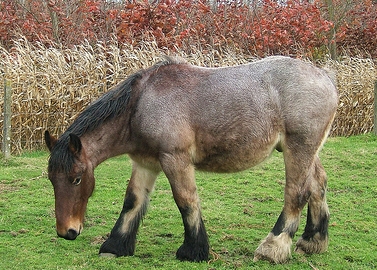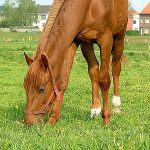Flaxseed is a grain normally grown in northern, cool climates. It is also referred to as flax or linseed. Canada is the leading producer of flax. Flaxseed is one of the few plants containing Omega 3. The fatty acids in omega 3 benefit horses in several ways, improving skin, hair and body condition and reduce […]
Horse Health
Owning a horse is a commitment to take care of all needs. It’s up to every horse owner and horse lover to ensure their health and well-being. We hope these articles help you keep your horse in the pink. Please remember that these articles are not meant as substitutes for your veterinarian. If your horse is ill, please see your vet asap.
Here’s the list!

Is Your Horse Ready for Senior Feed
The saying that you’re only as old as you feel can hold true for horses as well as humans. Opinions differ about what age a horse is considered a senior, with 20 years old being the average. But age doesn’t always determine how a horse functions. If your older horse has reached the point where […]

Rotovirus (ERV) in Foals
Diarrhea is a major cause of disease in foals. Veterinarians are more concerned with the causes of diarrhea, particularly rotovirus (ERV) with its high mortality rates. Rotavirus is a worldwide problem, but vets in the United States are seeing more cases. The higher numbers are occurring inall areas, especially California, Kentucky, New York and Texas, […]

Can a Virus Heal Horse Wounds
Some horses manage to injure themselves for example by finding the only fence board wire or loose fence board and causing cuts. These types of cuts are difficult to keep clean and take time to heal making the chance of infection a worry. Although the idea goes against what we believe, researchers in Canada and […]

When Should Your Horse Have Senior Feed
That old saying, “you’re only as old as you feel,” can hold true for horses too. Opinions differ about what age a horse is considered a senior, with 20 years old being the average. But age doesn’t always determine how a horse functions. If your older horse has reached the point where s/he is not […]

Improved Tieback Technique for Horses
A collapsed airway is known as Laryngeal Hemiplegia, also “roaring” due to the abnormal sound it can make. It commonly affects thoroughbreds, standardbreds and draft horses. A collapsed airway occurs due to the paralysis of the arytinoid cartilage in which vocal folds turn inward constricting airflow in and out of the lungs. It happens when […]

Cooling Your Horse in Cold Weather
After exercising your horse, cooling down is the next step, as even in cold weather, s/he sweats. It’s so important to see that your horse doesn’t become chilled due to it’s wet body. With colder temperatures, warming up before exercise loosens the muscles so vigorous exercise is easier on the horse’s body. Exercise produces enough […]

Farriers and Preventing Spread of Disease
As horse owners, you are all well aware of how disease can quickly spread and you take all necessary precautions to prevent this from happening such as not sharing equipment without first cleaning and disinfecting, no intimate contact or drinking from a communal trough, isolating new horses before adding them to your herd and so […]

Laminitis
Laminitis is a very painful, debilitating condition. It occurs when the Laminae ( a layer of keratinized epidermal and dermal tissue) which connects the hoof wall to the coffin bone separates. Laminitis can cause structural changes in the horse’s hoof resulting in lameness. Untreated, the coffin bone may eventually puncture the sole of the hoof […]

Seasonal Changes in Horse Nutrition
A horse’s nutrition needs vary a bit with the change in seasons. Feeding your horse an appropriate diet is essential to his/her good health. Spring brings new growth in plants and grass. Horses, particularly those who are usually not out in pasture, should be allowed at first to graze for an hour, increasing the time […]
